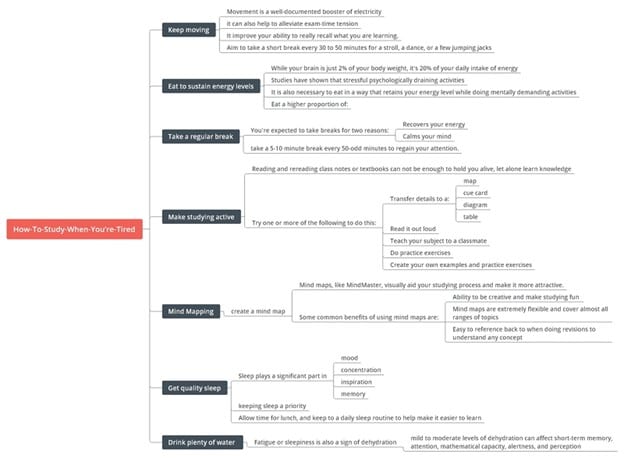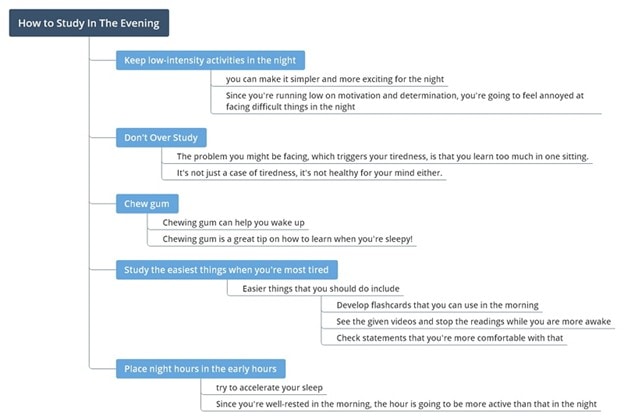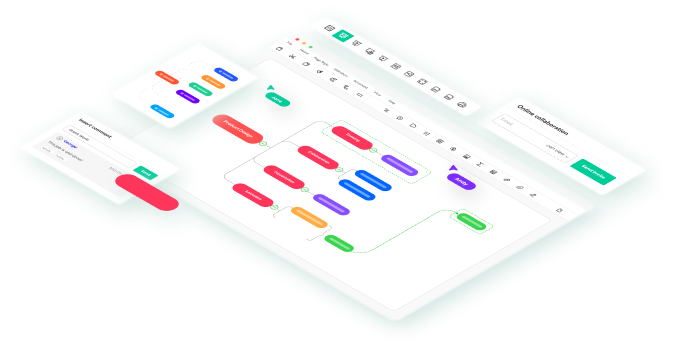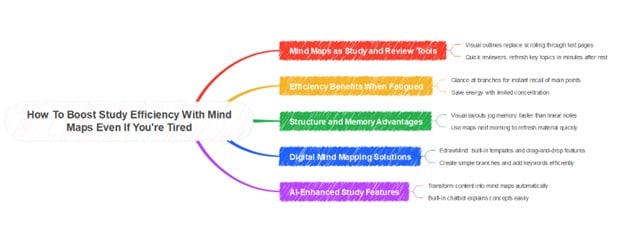
In this article
In today's age, you are generally aware of the importance of education and its role in shaping an individual's life.
Some people study to secure excellent grades, but for others, it's just a compulsion because they have no other choice.
Learning is never useful if you're too exhausted, so it's pointless to learn if you're exhausted. Some tips will help you study when you're tired.
Three easy ways to make sure you study when you're tired:
- Drink water
- Take short naps
- Decrease screen time

How To Study When You’re Tired
The motivation and passion for the study would directly influence productivity. Hence, when you're tired, you will have no intention to study, yet the deadline reminds you that you should finish your work as soon as possible.
As a result, mastering specific, efficient tips for learning when you're tired seems far more critical.

Keep Moving
Moving around will help your body's muscles expand. In addition to helping you stay awake, it can also help alleviate exam-time tension and improve your ability to recall what you are learning effectively.
Research indicates that students of all ages — from elementary school to college — found that 10 minutes of outdoor walking significantly increased memory efficiency, problem recognition, and quantitative problem-solving activities.
Aim to take a short break every 30 to 50 minutes for a stroll, a dance, or a few jumping jacks.
Eat To Sustain Energy Levels
While your brain is just 2% of your body weight, it's 20% of your daily intake of energy. Studies have shown that stressful psychological activities can exhaust an individual as much as physical work can.
Therefore, it is necessary to eat to maintain your energy level during demanding activities like intense study sessions.
Eat rice, porridge, low-sugar muesli, granola bars, cereal with seeds/nuts, low-fat milk, soups, vegetables, wholegrains, and most fruits. These foods steadily release glucose into the bloodstream, retaining energy levels for a more extended period.
Take Regular Breaks
Pause. Stop forcing yourself to sit through extended study sessions. It will affect your productivity and retention of information and have adverse effects on your mental health.
You're expected to take breaks for two reasons. Not only does it calm you, but it also restores your deteriorating concentration.
Your focus tends to decrease after about 50 minutes. If you choose to continue studying further, you'll learn with less emphasis, which is the equivalent of wasting time.
So, take a 5-10 minute break every 50-odd minutes to regain your attention.
Make Studying Active
Reading and rereading class notes or textbooks is not enough to hold your attention, let alone learn knowledge.
Straighten up. Stop learning like it's a chore. You can learn how to study when you're tired of using constructive learning strategies. Try one or more of the following tips listed below:
- Transfer details to a map, cue card, diagram, table, or another visual medium;
- Read it out loud;
- Teach your subject to a classmate;
- Do practice exercises;
- Create your examples and practice exercises.

Use Mind Maps
The best way to study, especially when you don't feel like it, is to create a mind map. Mind maps visually aid your studying process and make it more attractive. Some expected benefits of using mind maps;
- Ability to be creative and make studying fun;
- Mind maps are incredibly flexible and cover a wide range of topics.
- It's easy to reference back when doing revisions to understand any concept.
EdrawMind is a powerful mind mapping tool that makes it easy to create mind maps and present them in presentation mode.
Get Quality Sleep
Sleep plays a significant part in mood, concentration, inspiration, and memory — all of which affect learning. It's no joke that poor sleep is associated with low academic success.
In reality, prioritizing sleep — both short-term and long-term — is the most effective way to stay alert when studying. Allow time for breaks and support a daily sleep routine to help make learning easier.
Your productivity will drastically decrease if you don't nap, meaning you can work at a high pace even late in the evening if you've had a nap in the afternoon.
Your body needs proper rest. Don't shy away from taking care of your health.
Drink Plenty of Water
Fatigue or sleepiness is a sign of dehydration. Although dehydration doesn't only affect your energy levels, it may even impair cognitive processes, making it almost impossible to study.
Dehydration affects your brain activity and can slow you down. Studies have stated that mild to moderate dehydration levels can affect short-term memory, attention, mathematical capacity, alertness, and perception.
To make sure you don't doze off while studying, stay hydrated all day.
How To Study Long Hours in the Evening
Some people get used to studying in the morning, while others prefer learning at night. Here are some tips for studying in the evening, which could result in higher concentration and resolution.

Keep Low-Intensity Activities at Night
Ideally, you should keep the low-energy studying sessions for nighttime. Since you're running low on motivation and determination, you're going to feel annoyed when dealing with complex concepts at night.
And if you're stuck, with almost zero productivity, the best thing to do is to call it a day.
Don't Overstudy
Your drowsiness, which triggers tiredness, is because you learn too much in one sitting.
It's not just a case of tiredness -- it's not healthy for your mind either.
Well-known research showed that smaller volumes of studying spread over a week were safer for your brain than cramming done in one day. Break your studying into smaller chunks.
Chew Gum
Chewing gum can help you wake up. Chewing gum is an excellent way to learn when you're sleepy!
Scientists are not entirely sure that this is the case, but randomized controlled experiments have shown that people are more alert and better at interpreting information while chewing gum.
Study the Most Straightforward Things When You're Most Tired
The worst thing that you can do is study difficult concepts when you're tired. Instead, keep the more straightforward studying tasks like revising formulas or reading literature for the night.
Easier things that you should do include:
- Develop flashcards that you can use in the morning.
- See the given videos and do some quality readings of a text.
- Check statements that you're more comfortable with.

Place Night Hours in the Early Hours
If you go to bed at 11 p.m. and get up at 6 a.m. to leave your house at 8 o'clock, try to accelerate your sleep schedule by, say, one hour earlier to use the extra morning to prepare.
Since you're well-rested in the morning, you'll be more active than at night.
How To Boost Study Efficiency With Mind Maps Even If You’re Tired
Above, this article has recommended the use of mind maps for study efficiency. This is because when you’re already tired or sleepy, you’ll have to make the most out of your study session.
While it’s already proven that studying when you’re tired leads to lesser yields knowledge-wise, it doesn’t have to be. Remember, mind maps are also great as reviewers, so after you sleep, you can easily read the material.
How Mind Maps Boost Efficiency
Mind maps turn scattered material into a clear visual outline. Instead of scrolling through pages of text, you can glance at branches and instantly recall the main points. This saves energy and helps you focus even with limited concentration.
Another advantage is that mind maps work as quick reviewers. For example, if you’re too tired to continue and decide to rest, you can use your map the next morning to refresh key topics in minutes.
The structure and visuals jog your memory faster than linear notes.
Using Digital Tools
Digital tools like EdrawMind make the process easier. With built-in templates and drag-and-drop features, you can map out lessons without spending energy formatting. Even when tired, you can create simple branches, add keywords, and keep your study session productive.
AI tools can help you transform content into mind maps or ask the built-in chatbot to explain concepts more easily. There are many ways to use EdrawMind and mind maps for study efficiency.
Recommended Resources for Studying When Tired
Even with the right strategies, sometimes you need extra support. Tools, guides, and apps can provide structure when your energy is low. The following resources can help you stay productive even on tired days.

For Guides
Books and short reads can give practical advice on studying smarter with less effort. Make It Stick by Peter C. Brown, et. al. is a must-read, offering evidence-based techniques that work even if you’re exhausted.
For Tests
If you’re preparing for exams, platforms like Khan Academy and Quizlet are excellent. Khan Academy offers step-by-step lessons broken into short segments, which reduces mental strain.
Quizlet lets you create or use flashcards that are easy to review in five-minute bursts. Both platforms let you track progress without requiring hours of focus.
For practice exams, sites like Magoosh or Kaplan provide timed quizzes that simulate test conditions but allow you to pause or work in smaller chunks — ideal when tiredness limits your stamina.
For Tools
Study timers help structure your sessions. Forest is a popular Pomodoro app that keeps your work in 25-minute cycles with breaks in between. Forest even gamifies the process by growing virtual trees, giving you a small sense of reward.
Pair these with meditation or relaxation apps like Calm or Headspace, which offer five-minute exercises that can refresh your focus during breaks.
Noise-canceling playlists, available on Spotify or YouTube, can also block distractions and keep you on track when energy dips.
For Flexibility
Visual tools can make studying less overwhelming. Wondershare EdrawMind is particularly useful because it lets you turn complex notes into simple mind maps.
Rearranging branches, adding images, and tracking progress visually helps you study with clarity even when your concentration is low.
Because it’s available online and free to use, it works well for both quick reviews and more detailed planning.
These resources don’t replace good rest, but they can bridge the gap when you’re studying under fatigue. With the right mix of guides, tools, and platforms, you can maintain efficiency without burning out.
Conclusion
Staying alert and focused can be challenging, especially when you need to learn at the end of a long day. Yet there are ways to improve your alertness and stop nodding off in the middle of a study session.
You can learn how to study when you’re tired of using constructive learning strategies.
EdrawMind is the perfect mind mapping program. With the pre-made templates, the specialized map-making tool can help you quickly create your mind map and reduce the time required to ensure that your study session is productive.
FAQs
Lastly, here are some related questions on how to study when you’re tired or sleepy. Remember, though, that it’s still best to study when you’re fully energized. Still, here are some FAQs that may help you:
-
1. Is it worth studying when I’m tired, or should I rest?
If you’re completely exhausted, rest is better. However, a light review through tools like flashcards or mind maps can still be productive when you can’t focus deeply. -
2. What subjects should I prioritize when I’m low on energy?
Focus on lighter tasks. For example, review vocabulary, key formulas, or outlines. Save heavy problem-solving or essay writing for when you’re more alert. -
3. How can I stop myself from falling asleep while studying?
Switch your environment. Try sitting upright, standing for short periods, or reviewing while walking. Active recall methods, such as quizzing yourself, also keep you engaged. -
4. Can short study sessions be effective when I’m tired?
Yes. Even 15–20 minutes of focused review can help. For instance, you might use that time to revisit one chapter summary or redo a few practice questions. -
5. Do mind maps actually work when I’m low on energy?
Yes. Mind maps simplify information into visuals, so your brain processes it faster. Instead of reading pages of notes, you can glance at branches and recall entire lessons.





